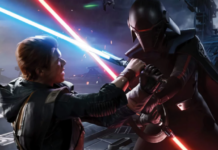In a very interesting interview with Gamesindustry.biz, Capcom Europe Boss Stuart Turner gave valuable insight into the way Capcom decides to produce games. The article goes over most of Capcom’s premier franchises and hints how easily some games could have become totally different.

Capcom Europe COO Stuart Turner and Head of Marketing Antoine Molant sat down with Gamesindustry.biz for a rather open and candid talk about the company’s recent success. Whether it is the quasi-reboot of the Resident Evil franchise by going back to its horror roots with last year’s Resident Evil 7 or the full remake of Resident Evil 2, Capcom has decided to drastically change the direction for one of their major franchises recently.
“But the world has moved on and these players have changed. And if we did [introduce old school mechanics], these fans might play it and actually decide it’s not what they wanted after all. But we played around with a few things in development. We did try first-person, we did try fixed camera. But the way the game has been designed, we decided that a third-person view works better.”
Of course, both are being received very well by the gaming community, with Resident Evil 7 becoming a mega seller. But what might be long expected by core fans wasn’t that clear of a choice for Capcom at first. We have to remember, before RE7 and RE2 were even unveiled, Capcom had little of feedback how such a drastic change in tone for the franchise would end up in reality. After all, Resident Evil might have started as a survival-horror game but has long become a full-on zombie-action game, and no matter how disappointed fans were with Resident Evil 6 it still sold millions of copies. Most publishers would never risk taking the franchise into a whole new direction in that position and Capcom executives deserve all the credit they get for greenlighting such risky moves.
It’s here where we learn that despite the opinion of some cynical gamers, Capcom indeed values critical and fan reception of their games, while of course essentially valuing commercial success as well.
“There is an artistic element that always comes in where we know this is the right way. And while if we compare RE7 to RE6 the absolute numbers are not the same, in terms of the profitability… it’s completely fine. It ticked all of our boxes internally. It was really well received. And in some respects, getting some very good review scores counts as much for Capcom as a game that sells millions and millions and millions. We’d prefer a game that got a 9 and sold less, than got a 6 but sold more.”
In the interview, we also learn that RE2 could have very well ended up vastly different to what we are seeing now. At one point, traditional – and clunky – tank controls for RE2 were even on the table and a first-person viewpoint ala RE7.

Big publishers tend to reach for success, thus limiting their ability to risky business decisions. With Japanese companies being traditionally even more conservative in that regard, it’s almost a miracle how Capcom ended up revamping several of their major franchises. Besides Resident Evil, Monster Hunter World marks an important new direction for the franchise which for a long time was at home on Nintendo’s handheld systems, selling regularly in the millions in Japan. With the World however, Capcom took on an immense risk to lose Japanese sales while trying to reach the worldwide audience.
It paid off in the end but things for the franchise in the West could have eaasily ended up drastically more grim in another case. So, Capcom deserves praise for being one of the biggest Japanese publishers – heck, any publisher to be honest – who listens to their fans and takes risk while trusting in their development teams and franchises.
I highly recommend reading the full interview.







